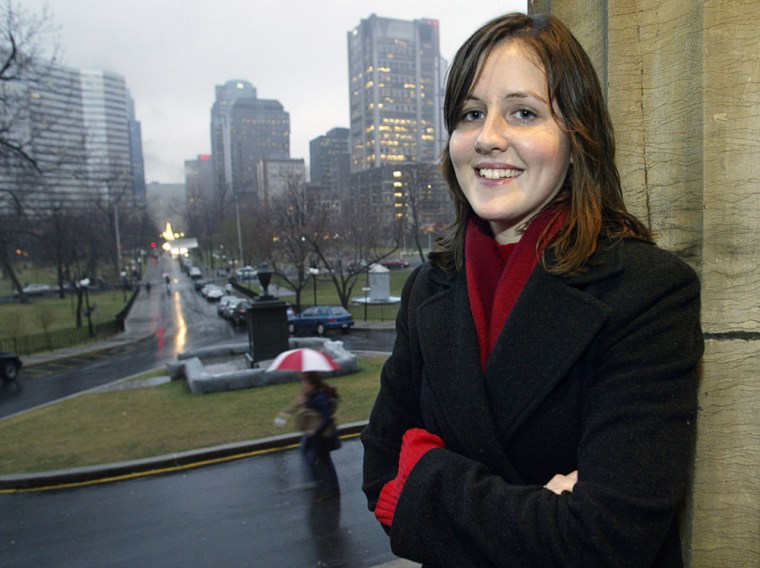For some, it's about the adventure of an extended stay at a foreign university. For others, it's about saving money or just getting farther away from home.
Whatever the reason, as they send out their college applications, attending school outside the United States is an option more high school students appear to be considering. Foreign universities are urging them on, smoothing the logistics and riding the U.S. college fair circuit to talk up their opportunities and often lower price tags.
No overall statistics are available, but the number of U.S. students pursuing degrees in some popular destination countries is growing:
- In Canada, the number of American undergraduates and graduate students has more than doubled since 1997 to about 6,000.
- In Great Britain, the number of full-time American undergrads is up 53 percent since 2001 to about 2,300.
- About 1,600 Americans are pursuing undergraduate degrees in Australia; the growth rate isn't available, but the overall number of Americans pursuing some form of study there rose 10 percent last year.
"We feel it's a) high quality, b) good value and c) it's going to give the students a very different educational experience," said Karen McBride, vice president for international affairs at the Association of Universities and Colleges of Canada.
While roughly 175,000 students at American universities go abroad for a limited stay — nine times out of 10 for a semester or less — applicants see enrolling full time as a chance for a richer experience.
"I don't think I'm going to miss out," said Susan Schell, a high school senior from Birmingham, Ala., who is applying to several universities in England. She hopes to work in Europe and thinks attending college there will help. To her, an American college wouldn't be all that different from high school.
"It seems to me, talking to people that live in Europe, that there's a different aura," she said. "The pace of living there is so beautiful."
Not for everyone
Sinead Keegan, from Boston and now in her final year at McGill University in Montreal, said she has gained a degree of independence — socially and academically — she wouldn't have gotten in the United States.
"It doesn't suit everybody, but I think I'm better prepared to head out into the real world than people who have had their hands held all along," she said.
McGill has tripled its enrollment of American undergraduates to more than 1,800 in less than a decade. Recruiters visit 150 U.S. high schools and college fairs each year, according to Howard Tontini, the school's recruiting director.
Many foreign schools are making the application process easier — often they consider the same materials, like SAT scores and high school transcripts, that American colleges require. Many guidance counselors say they encourage students to explore the option.
"We probably would get behind that, depending on the person, depending on the major," said Tom Hughart, guidance director at Wellesley High School in Massachusetts, who says he has noticed stepped-up recruiting by Scottish universities. "Someone who wants to teach English literature, going over to Trinity (College) in Dublin would make a lot of sense."
But college abroad isn't for everyone.
Students may come to regret missing out on quintessentially American college experiences outside the classroom, like football Saturdays or the "Greek" life of fraternities and sororities. They may discover that foreign universities don't offer the same resources as generally wealthier American ones, and students planning to return to the United States risk missing out on career networks and pipelines.
Gunnar Olson, Schell's guidance counselor at Indian Springs School near Birmingham, said some of his students who initially expressed interest this fall in going abroad — prompted by disappointment with the results of the U.S. presidential election — have since reconsidered. Even Schell said she may return after a year.
How to make the right choice
Jennifer Shields, a graduate of the University of St. Andrews in Scotland and co-author of the book "Study Away: The Unauthorized Guide to College Abroad," strongly recommends a campus visit to a foreign university.
"If you're completely in culture shock for a week, maybe it's not the best decision for four years," she said.
Shields said St. Andrews — a popular destination, with nearly 700 American undergraduates pursuing degrees — was the right decision for her. It exposed her to a wider variety of experiences, and was less expensive than her American options.
That is sometimes the case, and in England, undergraduate degrees can be completed in three years. But buyer beware: Foreign universities often charge international students several times more than domestic ones (hence the aggressive recruiting). More important, Americans may have better access to financial aid at home.
But for Keegan, who also considered an American college, McGill was too good a deal to pass up. The top tuition rate is about $12,600 in U.S. dollars, and Americans compete in the same pool as domestic students for merit aid.
"For me, the final decision was I liked two schools equally, and one of them was quarter of the price, and that was McGill," she said.
